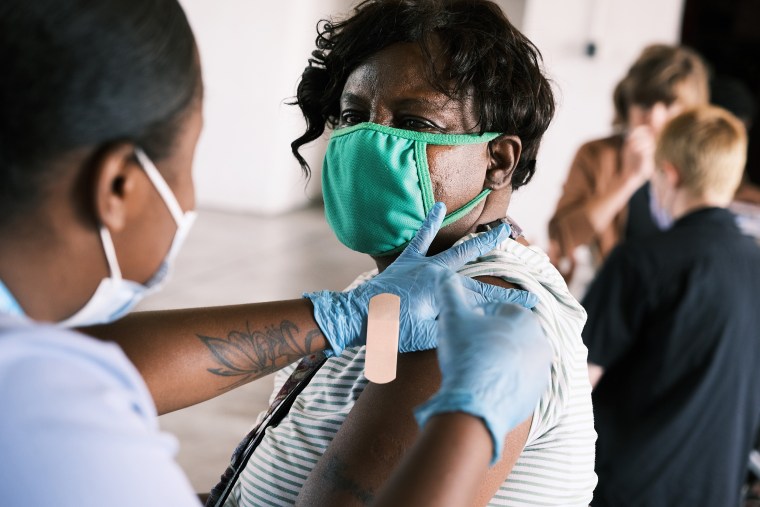Covid-19 killed a disproportionate number of the country's Blacks, Latinos and Native Americans last year and exacerbated health disparities among the groups, a new study concludes.
An estimated 477,200 more people died because of Covid-19 and other reasons from March to December 2020 compared to the same time in 2019, according to a study led by researchers with the National Cancer Institute published Monday in Annals of Internal Medicine.
Overall deaths of male and female Blacks, Latinos and Native Americans were two to three times higher than those of white and Asian males and females during the assessed period when population per 100,000 people was accounted for, the study said.
Of the 477,200 "excess deaths" last year, 351,400 people — or about 74 percent — died from Covid as the underlying cause, researchers said. The study said Black, Latino and Native American Covid-related deaths were "at least 2 times higher" than those of their white counterparts.
The disparities were similar when the 61,200 deaths that weren't attributed to Covid were factored in, the study said. Deaths among Blacks and Native Americans were three to four times higher, and Latino deaths were nearly two times higher, compared to white populations, the study said.
Meredith Shiels, an investigator with the National Cancer Institute who led the study, said in an email Tuesday that the pandemic's disproportionate effects on Black, Latino and Native American communities highlight the urgency of curtailing "longstanding structural inequities."
"These findings warn us that there is likely to be a severe widening of racial/ethnic disparities in all-cause mortality as longer-term data are released," she said. "Although vaccination rates accelerated rapidly during the spring of 2021, racial/ethnic inequities continue and will further drive mortality disparities if not addressed with urgency and cultural competence, as has been done by tribal communities."
Blacks, Latinos and Native Americans also were dying at higher rates last year because of medical conditions like diabetes, heart disease and Alzheimer, although there were increases among all groups, according to the study.
"Although racial/ethnic differences in COVID-19 death rates have been profound, focusing on COVID-19 deaths alone may underestimate the extent of racial/ethnic disparities driven by the pandemic," researchers said.
In total, 2.88 million people died in the time analyzed by the study last year. Researchers collected death certificate data from the Centers for Disease Control and Prevention and population estimates from the Census Bureau to reach their conclusions.
The study listed structural inequities as factors that have led to the pandemic's negative effects on many communities of color.
"Racial/ethnic disparities in COVID-19 risk, hospitalization, and death have been attributed to structural and social determinants of health with established and deep roots in racism," the study said.
The study mentioned specific social barriers that contributed to the disparities.
"Black and Latino persons are more likely to have occupational exposures to COVID-19 than White persons; they also are more likely to live in multigenerational households and more densely populated neighborhoods and have less access to health care and private transportation," researchers said.
"American Indian/Alaska Native reservation–based communities are at further risk for infection due to a lack of infrastructure and chronically underfunded health care facilities," they said. "Equitable vaccine distribution is needed to prevent further exacerbation of racial/ethnic disparities in COVID-19 risk and mortality."
Vaccine hesitancy among Black and Latino communities was also an impediment during the rollout last year, officials said.
